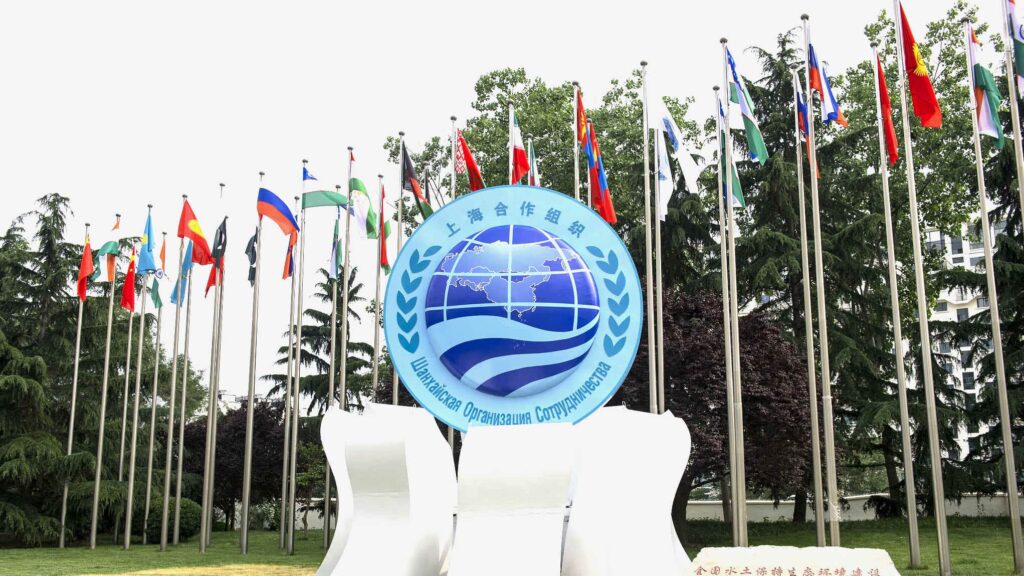

By Amal Malik, student of BA Comparative Literature, with an interest in post-colonialism.
08 February 2021
The Shanghai Cooperation Organization (SCO) was formed with the primary aim of mitigating security threats throughout Eurasia, with the secondary aims of enriching trade relationships and combatting humanitarian crises. The SCO was built upon the foundations of multilateral cooperation, with an adherence to international law and a mutual willingness to fulfil cross-border aims. Historically, the SCO has proved to stay clear of dispute and antagonism within the region and uphold neutrality to further its agendas. Furthermore, the organization strives to foster multicultural awareness and respect.
The SCO is an independent entity and does not form external alliances or target other bodies; apart from its aims, it abides strictly by the Charter of the United Nations, particularly upholding respect for territorial rights, national sovereignty and avoiding combat or violence under any cost. The association does not intervene in domestic affairs and uses pacifistic methods for dispute resolution. Structurally, the organization facilitates multilateral alliances that orient themselves towards tackling international or regional issues, uniting nations under a common cause.
The SCO in Action – Measures Implemented to Uphold Cross-border Security
During the SCO summit in Astana (June 2017), where member state leaders congregated to admit Pakistan and India into the association, a focus on the subcontinent emerged and the two neighbouring countries’ resources were brought to the table to further strengthen the SCO with the intention to maintain peace within the region. Currently, approximately 44% of the world’s population falls under the umbrella of the SCO, making it the largest regional organization in the world. Half of the world’s nuclear states are also embedded within the association, a deliberate manoeuvre which is meant to balance the strategic power balance, both across the globe and within the region.
The Astana Declaration, which was produced during the Astana Summit, builds upon the pillars of the United Nations Charter and international law to ruthlessly pursue diplomacy within Eurasia. In certain aspects, the SCO outperforms the United Nations itself in the realm of stabilizing international relations within the region and works closely with the World Organization. There have also been instances where the UN and SCO have joined forces, such as “The United Nations and the Shanghai Cooperation Organization: Jointly Countering Challenges and Threats” (November 2016 in New York) and “The United Nations and Shanghai Cooperation Organization in the Fight Against Drugs: Common Threats and Joint Actions (March 2017 in Vienna).
The SCO’s primary targets involve mitigating and stifling the threats of terrorism and cyberterrorism, extremism, global drug trafficking, separatism and transnational crime, mobilizing emergency response and protecting international information security. Our of these targets, the Regional Anti-Terrorist Structure (RATS) has been developed and is still in the process of formation. From 2011 – 2015, while RATS was only in its initial development phase, it thwarted 20 terrorist attacks alongside member heads of states, prevented 650 crimes of terrorist and extremist nature, dismantled 440 terrorist training camps and pacified 1,700 members of global terrorist organizations and 2,700 members of illegal armed group and incriminated 213 people associated with extremist terror networks as well, as well as 180 suspects on most wanted lists. With respect to weapon recovery, 3,250 detonative devices were found and seized, 10,000 weapons, 52 tonnes of explosives all under the premises of 600 incognito illicit weapon bases. The SCO Convention on Countering Terrorism, which was established in Astana, provides a legal framework for anti-terror and anti-extremist measures, working in conjunction with the United Nations Global Counter-Terrorism Strategy and key members of Security Councils. The statement issued by the SCO Heads of the Member States on Joint Counteraction to International Terrorism has proved to become a vital tool in uniting forces against terror and has facilitated international cooperation to extinguish the threat to international security.
In terms of tackling the root cause of terrorism, the SCO has also curated strategies to reduce radicalism, especially among the youth, while addressing the issues of xenophobia and racial intolerance as a result as an offshoot of terrorist activities and mass media portrayals. Heavy emphasis has been put on strengthening state autonomy to identify and outroot catalysts of radicalisation; this involves empowering mass media, NGOs, traditional religious groups and educational institutions to join the fight against terror and foster peaceful thinking among the youth. SCO members are also dedicated towards combatting pro-terror and separatist propaganda, further investigating identity theft and the financing of terror groups.
Combatting Transnational Drug Trafficking
The SCO aims to increase member state cooperation to combat international drug trafficking operations and has committed to do so by signing the 2015 Statement by the Heads of SCO Member States on Drug Threat, the 2004 Agreement on Cooperation between SCO Member States in Combating Illicit Trafficking of Drugs, Psychotropic Substances and Precursors and working alongside the UN General Assembly on the World Drug Problem Special Session (April 2016 in New York). So far, SOC bodies have seized 69 tonnes of lethal heroin, accounting for 14% of drug confiscations across the globe and has also seized 75 tonnes of precursors.
Economic Strategies of the SCO and Trade Goals
The SCO aims to increase economic transparency, particularly with respect to trade and to further mobilize the global economy and foster economic stability for its member states. Protectionist and non-discriminatory practices are essential prerequisites for all states involved, especially if they are to capitalize on multilateral trade. The SCO aims to improve trade conditions, support foreign investment for members and build industrial parts to facilitate vocational opportunities. The agreement on Creating Favourable Conditions for International Road Transportation (agreed upon September 2014 in Dushanbe) exemplifies an agenda to increase trade from eastern Europe to China and has fostered developments in regional infrastructure and transport.
Fostering Multicultural Links
Fostering educational collaboration and facilitating cultural dialogue is one of the key strategies the SOC implements to reduce xenophobia and intolerance. The cultural sites within the nations of SOC members comprise 20% of the UNESCO World Heritage List. Through international competitions, festivals and scholarly pursuits, the SOC aims to foster peace by enabling deeper, humane connections through cultural understanding and appreciation.
Disclaimer: The views expressed in the article are of the author and do not necessarily represent the institute’s policy.

